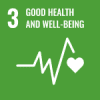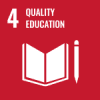The high rate of Non-Communicable Diseases (NCD) in Indonesia is quite alarming. Data from WHO (2018) shows that around 73 percent of NCD accounts for deaths in Indonesia. The highest case is heart disease, 35 percent, second place is cancer, 12 percent. Meanwhile, deaths due to infectious diseases, maternal and infant deaths, and nutritional problems were around 21 percent.
The Faculty of Medicine, Public Health and Nursing (FK-KMK) UGM as an educational institution engaged in the health sector under the Health Promoting University (HPU) program shows its commitment to realizing a healthy campus by launching the Integrated Assistance Post (Posbindu) ‘SEHATI’ (Sejahtera, Aktif, dan Bermutu Tinggi; Prosperous, Active and High Quality) last Friday (22/11).
Dr. Supriyati, S.Sos., M.Kes. FKKMK saw the high incidence of Non-Communicable Diseases (NCD) which has driven FK-KMK UGM to contribute to the success of the health literacy program for all academicians, starting from the ability to access information, understand, and make decisions to live healthy.
“Posbindu SEHATI activities are managed by employees and staff of FK-KMK UGM to try to monitor and detect NCD risk factors early,” said Supriyati.
The objective of this activity is to increase the participation of the FK-KMK UGM academic community in efforts to prevent and detect early risk factors for Non-Communicable Diseases (NCDs). Posbindu’s targeted age population is quite broad, starting from people aged 15 years and over.
Posbindu generally has 5 service desks. One of the features of Posbindu SEHATI FK-KMK UGM is the availability of consultation on physical activity and dietary/health nutrition patterns.
“A healthy lifestyle should be started for better health quality. One that is difficult to change is behavior. Therefore, through the Posbindu SEHATI program, FK-KMK UGM does social engineering efforts to change the health behavior of academicians by monitoring risk factors and intensifying health literacy efforts,” said Supriyati.
Source: https://ugm.ac.id/id/berita/18787-penguatan-literasi-kesehatan-melalui-posbindu-sehati



